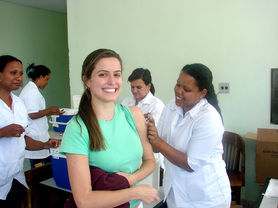By: Susan Even, MD, University of Missouri-Columbia
The Advisory Committee on Immunization Practices is a group of medical and public health experts that develops vaccine recommendations. The Centers for Disease Control and Prevention uses these recommendations to develop vaccine schedules that include the target age, number of doses, and dose interval. The recommendations are the cornerstone of prevention in U.S. health care.
ACHA is one of 30 professional organizations with an official liaison to the ACIP. As the ACHA representative, I am charged with providing input regarding the impact of ACIP recommendations in the college health setting, and I attended the most recent ACIP meeting at CDC in Atlanta this past October. At this meeting – one of three held each year – the committee discussed vaccine research, safety, and supply, among other things.
Here are some of the topics that were addressed by the ACIP at its October meeting:
ACHA is one of 30 professional organizations with an official liaison to the ACIP. As the ACHA representative, I am charged with providing input regarding the impact of ACIP recommendations in the college health setting, and I attended the most recent ACIP meeting at CDC in Atlanta this past October. At this meeting – one of three held each year – the committee discussed vaccine research, safety, and supply, among other things.
Here are some of the topics that were addressed by the ACIP at its October meeting:

Meningococcal vaccine back in the news: The ACIP voted to recommend use of quadrivalent vaccine MenACWY CRM in infants (aged 2-23 months) at increased risk meningococcal disease. The vaccine protects against meningitis serogroups A, C, W, and Y. This is the first quadrivalent vaccine for meningitis that the FDA has approved for use in infants under six months. It may also be used for healthy infants prior to travel to countries in which meningococcal disease is epidemic. This is the same conjugated meningitis vaccine used in the adolescent and college age population.
Pertussis vaccine supply: All pertussis-containing vaccines have been in short supply, and although shipping has resumed, availability will remain somewhat low over the next several months. Follow vaccine shortages here.
Influenza: Influenza activity in the U.S. is currently minimal, so there’s still time to get our students immunized. The most successful approach? One study showed that 71% got the flu vaccine if a provider both recommended and offered the vaccine in the same visit. Last year showed important increases in flu vaccines coverage in adults over 18 and all health professionals. Follow flu activity this season here.
The next meeting will be in February 2014. Some of the topics on the agenda:
MMWR “General Recommendations on Immunization”: This document will contain important updates in vaccine administration, use of multi-dose vials, and safety engineered syringes.
ACIP Statement on HPV Vaccine: ACIP is working on providing further guidance on the HPV vaccine to address the low uptake in adolescents compared to other vaccines that are given at this age. Part of the problem has been that parents may regard the HPV vaccine as a gateway to sex and not the cancer-prevention strategy that it really is. In the meantime, have you seen CDC’s Tips and Time-savers for Talking with Parents About HPV Vaccine?
CDC’s Updated Immunization Schedules: Updates to the vaccine schedule are released each February schedule. ACHA’s Recommendations for Institutional Prematriculation Immunizations will also be updated to reflect the new schedule and recommendations on vaccines for college students.
Minutes and presentation slides from ACIP meetings can be found here.
Pertussis vaccine supply: All pertussis-containing vaccines have been in short supply, and although shipping has resumed, availability will remain somewhat low over the next several months. Follow vaccine shortages here.
Influenza: Influenza activity in the U.S. is currently minimal, so there’s still time to get our students immunized. The most successful approach? One study showed that 71% got the flu vaccine if a provider both recommended and offered the vaccine in the same visit. Last year showed important increases in flu vaccines coverage in adults over 18 and all health professionals. Follow flu activity this season here.
The next meeting will be in February 2014. Some of the topics on the agenda:
MMWR “General Recommendations on Immunization”: This document will contain important updates in vaccine administration, use of multi-dose vials, and safety engineered syringes.
ACIP Statement on HPV Vaccine: ACIP is working on providing further guidance on the HPV vaccine to address the low uptake in adolescents compared to other vaccines that are given at this age. Part of the problem has been that parents may regard the HPV vaccine as a gateway to sex and not the cancer-prevention strategy that it really is. In the meantime, have you seen CDC’s Tips and Time-savers for Talking with Parents About HPV Vaccine?
CDC’s Updated Immunization Schedules: Updates to the vaccine schedule are released each February schedule. ACHA’s Recommendations for Institutional Prematriculation Immunizations will also be updated to reflect the new schedule and recommendations on vaccines for college students.
Minutes and presentation slides from ACIP meetings can be found here.
Image courtesy of Sandra Rugio/Wikimedia Commons

 RSS Feed
RSS Feed